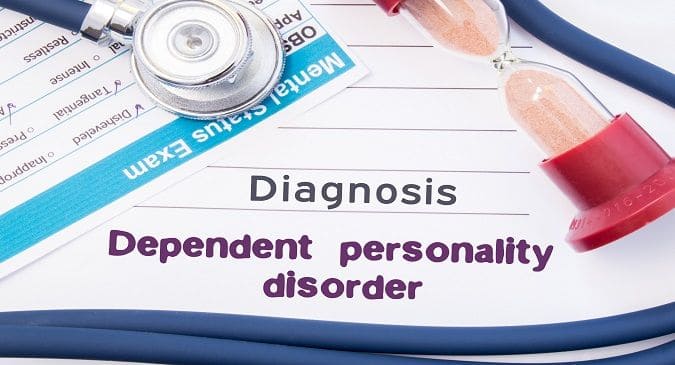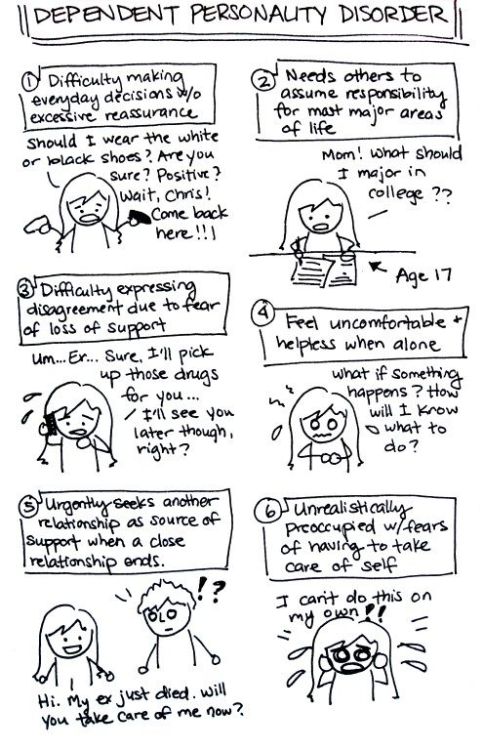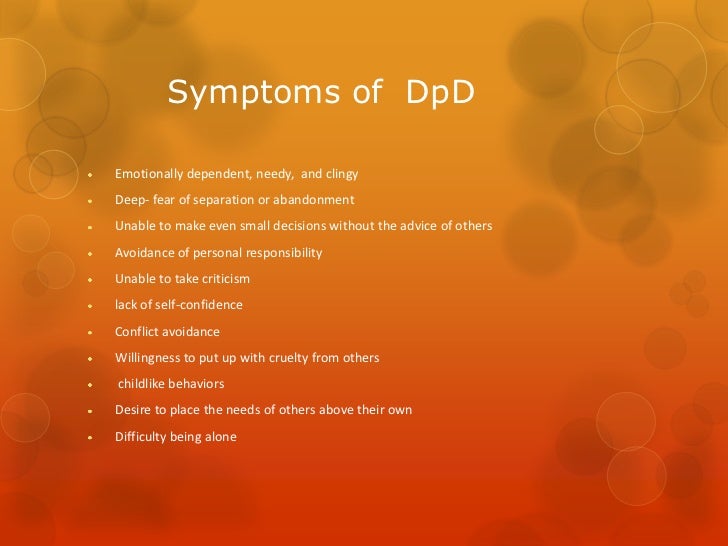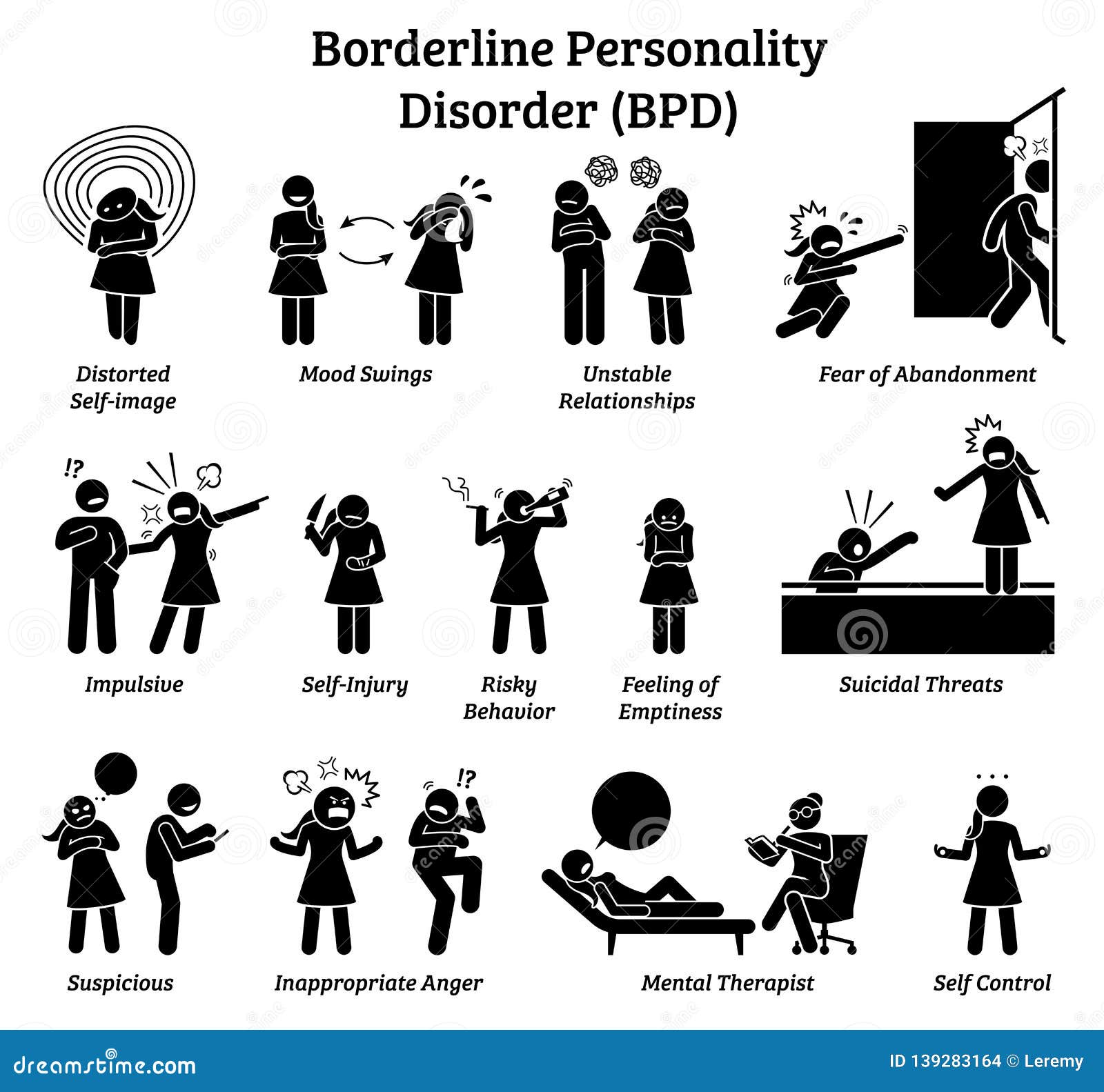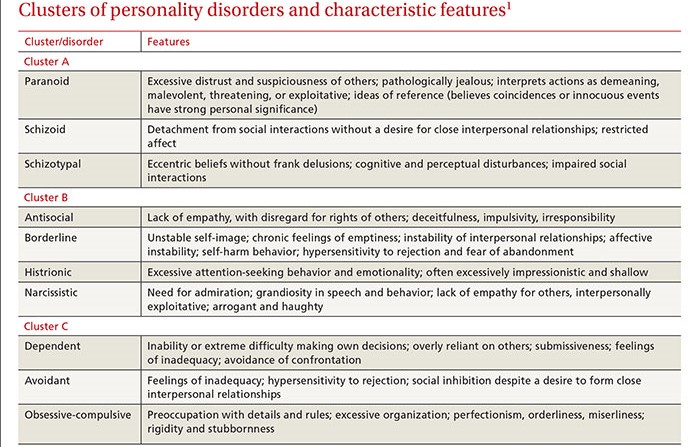The Diagnostic and Statistical Manual of Mental Disorders, 5th Edition (DSM-5), provides a comprehensive framework for symptoms and classification of behavioral health conditions. However, efforts to make codependency a recognized disorder have been unsuccessful. The latest iteration of diagnostic criteria, the DSM-5, only includes dependent personality disorder as an official diagnosis, not codependency.
These symptoms give a picture of just how much destruction Dependent Personality Disorder can cause in an individual's life. The disorder often introduces many personal and professional difficulties. Personally, people with the disorder have a hard time forming mutual relationships that do not becoming clingy or dependent. People with the disorder often do not have relationships outside of their family. Professionally, people with the disorder look for others to take care of them so they rarely take initiation—something that is essential in the professional world.
In addition, the disorder raises people's risk of other mental illnesses, including other anxiety, depression, adjustment, and personality disorders. Dependent Personality Disorder will typically have major impacts on most areas of functioning. As an adult, there are societal expectations for independence, decisiveness, confidence, and self reliance, particularly in American culture. An individual who does not meet these expectations will have difficulty functioning in occupational, academic, and interpersonal settings. Individuals with Dependent Personality Disorder may continue to reside with their parents past their twenties, may not learn how to drive a car, may be unemployed, and not continue or complete their education.
It is noted in the DSM -5 that Individuals with Dependent Personality disorder will tolerate situations from which others would promptly withdraw, including verbal, physical and sexual abuse. Women with Dependent Personality Disorder were found to be at risk for spousal abuse. Due to economic and emotional dependence of their abusive husbands (Loas, Cormier, & Perez-Diaz, 2011). Individuals with dependent personality disorder may be viewed with pity, disgust, anger, frustration, or contempt by others, and will try the patience of others, , including their clinicians.
There may be a reciprocal causality for the abuse of persons with Dependent Personality Disorder. They tend to be naïve, have poor boundaries, and enter new relationships without forethought of potential risks and may be prone to exploitation by predatory individuals. In this way, a very unhealthy relationship dynamic will be established. Schizoid - this is characterised by withdrawal from affectional, social and other contacts.
A low threshold for violence and a tendency to blame others may be features.Emotionally unstable - people with this personality disorder tend to be impulsive and unpredictable. Relationships tend to be unstable and there may be suicidal gestures and attempts.Histrionic - this is characterised by shallow and labile affectivity and theatricality. There is lack of consideration for others and a tendency for egocentricity. People with this type of personality often crave excitement and attention.Anankastic - this is characterised by feelings of doubt, perfectionism and excessive conscientiousness. People with this type yearn to be liked and accepted, are sensitive to rejection.
There is a tendency to exaggerate potential dangers and risks, leading to an avoidance of everyday activities.Dependent - this is characterised by a reliance on others to take decisions and a fear of abandonment. There is an excessive reliance on authority figures and difficulty in acting independently. This can affect the capacity to deal with the intellectual and emotional demands of daily life. People tend to seek interaction, connections, attachments, and relationships with other people. In fact, mental health is partly defined with regard to the strong emotional attachments to, and flexible interdependence on, close relationships we maintain with one another.
But when interdependence becomes unbalanced to the degree that it is one-sided, it can become problematic, particularly if dependent personality disorder is involved. DPD can have a major impact on the ability to function in daily life. For instance, society holds expectations regarding individual decisiveness, independence, and self-reliance that are dependent on age and situation, such as physical or medical issues. A person who does not meet those expectations could face difficulty functioning in school, work, and other interpersonal situations. Personality disorders are a specific type of behavioral health disorder that affect an individual's ability to function and maintain a high quality of life.
People who struggle with a personality disorder may have difficulty maintaining healthy relationships and often have a skewed perception of themselves and others. Codependent personality disorder can affect a person's quality of life and relationships, and it may occur with other mental health disorders. A quick read through these red flags, signs, and symptoms gives a little picture of the difficulties that Dependent Personality Disorder can cause. The disorder can introduce many personal and professional handicaps into an individual's life. Professionally, those with the disorder may have difficulty finding and maintaining a job because they often lack initiative and confidence.
Personally, people with the disorder often have social circles that are limited to their family and/or caregivers. The disorder also increases their risk for other mental health problems such as depression, anxiety, and adjustment disorders. The goal of therapy is to help the person with DPD become more active and independent, and to learn to form healthy relationships. Short-term therapy with specific goals is preferred when the focus is on managing behaviors that interfere with functioning.
Borderline personality disorder is defined by "a pattern of instability in interpersonal relationships, self-image, and affects, and marked impulsivity," says the DSM. Not only do these individuals lack a solid sense of identity, but they also have difficulty forming and keeping relationships, Dr. Krakower says. However, they may benefit from certain types of therapy such as dialectical behavior therapy .
The argument against having a distinct diagnosis for codependency stems from the idea that the condition shares too much overlap with other mental health conditions to merit its own diagnosis. For example, codependency symptoms overlap significantly with dependent personality disorder , as well as borderline personality disorder . Because of these factors, it is important for mental health professionals to carefully diagnose the disorder.
The Diagnostic and Statistical Manual of Mental Disorders, Fifth Edition (DSM-5) outlines the diagnostics for Dependent Personality Disorder (301.6[F70.7]). Often, the condition develops as people transition from adolescence into adulthood. They often have difficulty making that change and enter into a fully self-sufficient maturity. Further, the disorder increases an individual's risk of other anxiety, depression, personality, and adjustment disorders. Although hospitalization is sometimes necessary for the treatment of an Axis I disorder in individuals with dependent personality disorder, residential treatments are generally not indicated.
DPD is a personality disorder characterized by a pervasive and excessive need to be taken care of. Other disorders included in Cluster C are avoidant and obsessive-compulsive personality disorders; all three show high levels of anxiety. Drugs do not cure personality disorders but they may be useful as an adjunct so that the patient may productively engage in psychotherapy. The focus is on treatment of symptom clusters such as cognitive-perceptual symptoms, affective dysregulation and impulsive-behavioural dyscontrol.
Such symptoms may complicate almost all personality disorders to some degree but all of them have been noted in borderline personality disorder. A quick look at the diagnostics for Dependent Personality Disorder shows how destructive the disorder can be in an individual's life. It introduces severe handicaps into people's professional and personal lives. Professionally, people with the disorder often have difficulty securing and maintaining a job because of their insecurities and lack of initiative. Personally, people with the disorder often have limited social circles, and they face an increased risk of other mental health disorders like depression and anxiety.
The only treatment for dependent personality disorder is long-term behavioral therapy. The behavioral therapy will help the person suffering to learn how to manage the DPD. People dealing with dependent personality disorder will often find themselves in unhealthy relationships that can lead to mental abuse, physical abuse or both.
This is a simple example of the significance to find professional assistance to manage the disorder. A dependent personality disorder treatment center can help a man or woman learn to control the disorder through various behavioral treatments. Dependent personality disorder frequently occurs in tandem with other personality-based mental illness, such as borderline, histrionic, and avoidant personality disorders . It is also believed that those diagnosed with dependent personality disorder are at an increased risk of mood and anxiety disorders.
Interpersonal therapy focuses on how mental health issues can affect relationships. After an initial assessment in the early sessions, together with a therapist the interpersonal issues will be identified and ranked in order of importance. Then the aim will be to develop a set of adjustments, and how to implement them in daily life. This type of therapy is best suited to people that have been diagnosed with dependent personality disorder, as the therapy is very targeted and usually lasts between 12 and 16 sessions.
Dependent personality disorder is a mental health issue where sufferers exhibit an excessive need to be taken care of, resulting in needy and submissive behaviour. It is categorised as a Cluster C personality disorder, which also houses avoidant personality disorder and obsessive compulsive disorder. Cluster C personality disorders all exhibit heightened levels of anxiety; in the case of someone with dependent personality disorder, feeling alone and being helpless are the main sources. In addition, a codependent often feels compelled to take care of others and feels a need to be liked by everyone.
Intimacy issues, fear of abandonment, and confusing love with pity are common traits. As a whole, these symptoms pertain to a single person or family as opposed to dependent personality disorder where the symptoms apply to people within the social network as a whole. Taking a codependency quiz can help to better understand the symptoms and traits inherent in people who struggle with the condition.
Dependent Personality Disorder shares the most overlap with codependency. The primary distinction between DPD and codependent people is the nature of the relationship. Codependent individuals tend to display dependent traits focused on a specific person, while dependent personality disorder refers to dependent traits toward others in general. Similarly, a person with borderline personality disorder struggles with stability in interpersonal relationships, while codependency involves a specific dependence on an individual.
Without a doubt, Dependent Personality Disorder can wreak havoc in an individual's life. It is a serious illness, and like other serious illnesses, healing often requires treatment. With intervention, it may be possible for people with the disorder to live independent, self-sustaining lives—to live their own lives. Thriveworks Newport News works with many clients, and we offer holistic and individualized therapy. Some clients benefit from cognitive behavioral therapy while others need psychodynamic therapy. Our mental health professionals are committed to helping their clients find the specific treatments they need.
Cognitive-behavioral therapy focuses on patterns of maladaptive thinking and seeks to eliminate them. Often people in cognitive-behavioral therapy set goals that they eventually try to achieve without relying on others. Often the patient is receptive to the treatment and seeks help with their personal relationships. With this particular kind of therapy, the therapist will help the patient understand how they interact with others and how this contributes to their dependency issues. This particular therapies purpose is to show the patient that their dependency comes with a high price and that they do have alternatives. Another type of therapy used to treat dependent personality disorder is group therapy.
Often people taking part in group therapy must be highly motivated to see improvement. Studies show that time-limited assertiveness-training groups with very clear goals are successful. It has also been said that family or martial therapy can improve a person's independence by working on the families relationship as a whole. We publish material that is researched, cited, edited and reviewed by licensed medical professionals. The information we provide is not intended to be a substitute for professional medical advice, diagnosis or treatment.
It should not be used in place of the advice of your physician or other qualified healthcare provider. Dependent personality disorder is characterized by a pervasive and excessive need to be taken care of, leading to a dependence on others to meet one's emotional and physical needs. Individuals with DPD tend to display needy or clingy behavior and have a fear of separation. DPD also leads to difficulties in decision-making; sometimes, individuals with DPD struggle making choices as seemingly simple as 'what to wear today' without the advice and reassurance of others. However, when left untreated, DPD can develop into other medical and mental health conditions including depression, anxiety, avoidant personality disorder, and substance abuse.
This is especially prevalent for those individuals who also experience high interpersonal stress and poor social support. It is not uncommon for people with personality disorders to offend against the law and come into contact with the criminal justice system.They are often held to be untreatable. Treatment is prolonged, difficult and far from universally successful. When society is preoccupied with a punitive approach to offenders rather than the rehabilitation of offenders, the result is overcrowded prisons and recidivism amongst offenders. Jack Straw, when he was Home Secretary, wrote that one of the most important steps for the prevention of re-offending was that the person should secure a job.
However, most employers enquire about criminal records and hold it against potential employees. The management of those with personality disorders, including those who have run foul of the law, is not easy and success is limited but the stakes are such that it is essential that society make the effort. People with personality disorders are at increased risk for many psychiatric disorders. Mood disorders are a particular risk across all personality diagnoses.
Patients with depression and personality disorder have a more persistent condition than those who have depression alone.Some types of mental illnesses are more specific to particular personality disorders. Psychotherapy, and sometimes medication, are both used in the treatment of substance use disorders and dependent personality disorder. As a result, many forms of psychotherapy can simultaneously treat both conditions. For example, dialectical behavioral therapy and cognitive-behavioral therapy can both primarily be used to treat substance use disorders and DPD. "Codependency" initially referred to someone in a relationship with a person struggling with a substance use disorder.
However, modern definitions of the term encompass a wide range of dependent behaviors – emotional, social, or physical. The concept of codependency still applies to families with substance dependencies, but it also refers to other situations where drug or alcohol use is not present. Codependent individuals are more than just dependent on others – their happiness is determined by meeting others' needs and wants, even if those are unreasonable.
Dependent personality disorder is one of the most commonly diagnosed mental health disorders. It is a condition in which people depend on others too much to meet their physical and emotional needs. While there is no known direct cause for DPD, it is thought that the disorder may be a result of a mix of environmental, genetics, temperamental, and developmental factors.



